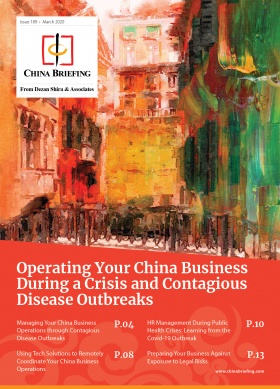China Announces More Fee Cuts, Companies Expected to Save RMB 310 billion in 2020
On June 17, Premier Li Keqiang presided over an executive meeting of the State Council, which announced a series of fee reductions for businesses in order to stabilize their economic outlook and to shore up market confidence.
The latest cuts include reductions and waivers to electricity fees, port costs, highway tolls, telecommunication rates, and oil liability insurance. If taken together with the cuts introduced since the outbreak started, companies are expected to save around RMB 310 billion (US$44 billion) over the course of this year.
At the same time, the announcement also directed financial institutions to decline loan interest rates, issue preferential interest rates loans, and reduce bank charges, among other measures.
“[As a result of] the COVID-19 impact, many enterprises have encountered difficulties in work and production resumption,” Premier Li Keqiang said at the State Council Meeting he presided over. “Under such circumstances, it is necessary to reassure the market with a clear signal that the fee-cutting measures will be fully executed to help them out.”
The crux of the announcement is therefore, to help enterprises – particularly small and medium-sized enterprises, or those in manufacturing and common services industries.
What are the fee cut measures?
The State Council Meeting called for the extension and full delivery of a variety of fee cuts for businesses.
Some of the notable fee cut measures include:
- Lowering industrial electricity costs by 5 percent;
- Removing civil aviation development fund contributions;
- Scrapping port construction fees;
- Cutting shipping pollution insurance payments in half; and
- Reducing the average telecommunications rates by 15 percent.
Premier Li also called for the removal of excessive or unlawful taxes and charges, as part of efforts to ease the unreasonable pressure on enterprises. In line with this, any refunds, exemptions, or waivers should be promptly carried out and returned to the enterprises. Further, the regulation of fees should be streamlined, particularly for major industries, such as import and export, financing, public utilities, and logistics.
Collectively, the fee cuts are expected to save companies around RMB 310 billion (US$44 billion) over the course of this year – factoring in the cuts that already announced when the outbreak first began.
Financial and monetary policies to ease corporate burden
At the same time, the announcement also urged financial institutions to make a stronger effort to leverage monetary and financial policies to ease corporate burdens and spur on business profitability. These include:
- Reducing loan and bond interest rates;
- Issuing preferential interest rates loans;
- Implementing deferred principal and interest payments for small and medium-sized enterprise loans;
- Supporting the issuance of small and micro-enterprise unsecured credit loans, and;
- Decreasing bank charges.
If implemented, these policies are expected to bring benefits amounting to RMB 1.5 trillion (US$210 billion) to companies of all types over the course of this year.
Targets set by the 2020 Government Work Report
The announcement reinforces China’s policy of “stability on six fronts and security in six areas,” which are baseline guarantees made by the government about the standard of the economy and society.
As reported by the state media Xinhua, “the six fronts refer to employment, the financial sector, foreign trade, foreign investment, domestic investment, and expectations. The six areas refer to job security, basic living needs, operations of market entities, food and energy security, stable industrial and supply chains, and the normal functioning of primary-level governments.”
To achieve this during the COVID-19 period, the government has pledged to introduce more monetary and financial policies to bring about a “market-oriented, law-based, and internationalized business environment.”
From January to May of this year, the central government has gradually rolled out measures guiding reserve requirement ratio (RRR) cuts, relending discounts, and market interest reductions to decrease company financing costs.
Following these efforts, China is now putting forward the goals set forth by the 2020 Government Work Report delivered earlier this May – to reduce the corporate burden by over RMB 2.5 trillion (US$350 billion) in 2020, enhance financial support for stable business operations, and to make monetary policy more flexible and appropriate.
If these financial and monetary policies are implemented, they are expected to bring benefits amounting to RMB 1.5 trillion (US$210 billion) to companies of all types over this course of this year.
The government has stipulated that it will continue to use policy to direct these funds towards small and medium enterprises within the manufacturing and the service sector.
About Us
China Briefing is written and produced by Dezan Shira & Associates. The practice assists foreign investors into China and has done so since 1992 through offices in Beijing, Tianjin, Dalian, Qingdao, Shanghai, Hangzhou, Ningbo, Suzhou, Guangzhou, Dongguan, Zhongshan, Shenzhen, and Hong Kong. Please contact the firm for assistance in China at china@dezshira.com.
We also maintain offices assisting foreign investors in Vietnam, Indonesia, Singapore, The Philippines, Malaysia, Thailand, United States, and Italy, in addition to our practices in India and Russia and our trade research facilities along the Belt & Road Initiative.
- Previous Article Business Risk Management in China in the Era of COVID-19
- Next Article Opportunities for Foreign Investors in China’s Service Industries After COVID-19 – New Issue of China Briefing Magazine









